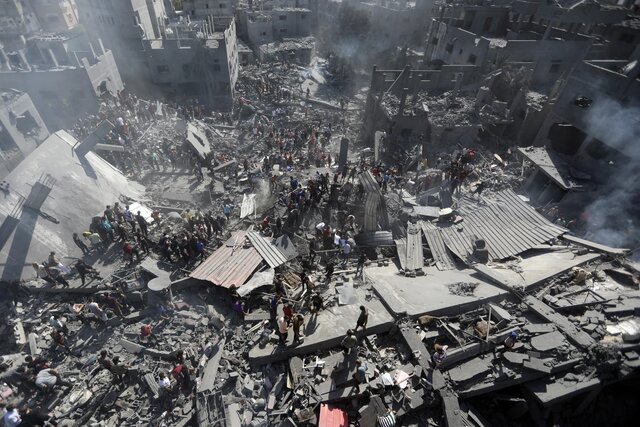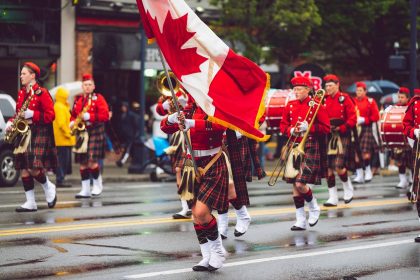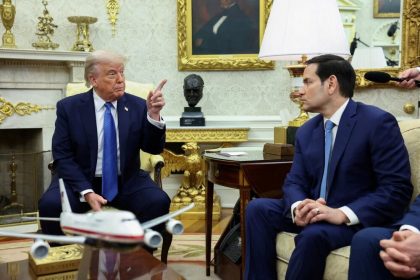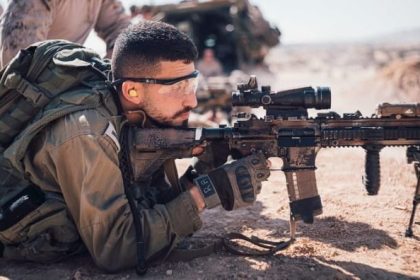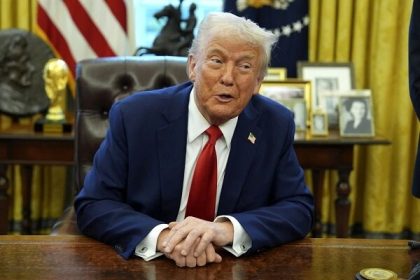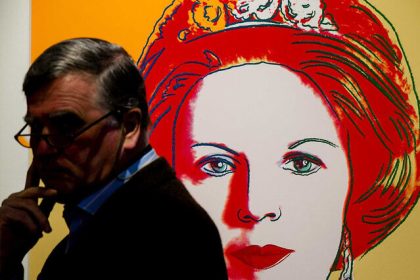European diplomat: The meeting between Iran and the Persian Gulf Cooperation Council was a great opportunity for de-escalation
The EU’s special representative for the Persian Gulf affairs explained the goals of this initiative on the eve of the joint meeting of the parties in Luxembourg amid the developments in the region.
According to Isna, “Luigi DiMaio”, the representative of the European Union in the Persian Gulf affairs, on the eve of the joint meeting of the European Union and the Persian Gulf Cooperation Council on October 16 (October 25) in Brussels, said that this initiative was proposed by the European Union in May 2022. which is an important step in the relations with the Persian Gulf countries and shows the desire of the European Union to cooperate on strategic partnerships with the countries of the Persian Gulf Cooperation Council.
The goal of the strategic initiative of the Persian Gulf Cooperation Council and the European Union
According to Di Maio, “in addition to strengthening the EU-GCC partnership, this strategy also aims to address the EU’s security concerns in the region.”
Di Maio, former Minister of Foreign Affairs of Italy and the current representative of the European Union in Persian Gulf affairs, said in an interview with the “Institute of International Political Studies of Italy” that the timing of this initiative is important; It reminds us that before the invasion of Ukraine and the war in Gaza, the European Union also needed a closer partnership with the Persian Gulf countries. In addition to holding meetings and this meeting, this strategy also has an executive part, which is the responsibility of the EU Special Representative in the Persian Gulf, which is the position I hold now.
The ultimate goal of this strategy for the EU is to create organized and targeted channels with the GCC countries that will allow the EU to approach them, elevate our partnership to a strategic level and address multilateral issues through our shared experiences.
He stated: This strategy has five pillars; Trade and investment, energy (especially renewable), regional security, people-to-people exchanges (including through universities, education, visa facilitation, etc.) and interagency partnerships. The ultimate goal of this strategy for the European Union is to create organized and targeted channels with the countries of the Persian Gulf Cooperation Council, which will allow the European Union to approach them, elevate our partnership to a strategic level, and address multilateral issues through our shared experiences.
Referring to the timing of the joint meeting of the European Union and the Persian Gulf Cooperation Council, Di Maio said: holding this meeting is one of the most important goals of this strategic initiative. Despite the fact that we have had a cooperation agreement with the Persian Gulf Cooperation Council countries since 1989, a meeting at the level of leaders has never been held. This meeting is held at a critical time, not only for West Asia and Ukraine, but also for the world, and includes a final summary in the form of a joint statement by all its participants. I expect it to be two-sided, one side is political and the other side is about the multilateral program.
Gaza war
The impact of the Gaza war on the relations between the European Union and the Persian Gulf countries
In another part of this conversation, he answered whether the “Al-Aqsa Storm” operation on October 7, which was carried out by the Hamas movement against the Zionist regime and initiated the Zionist regime’s attacks on Gaza, will bring European countries and the Persian Gulf region closer to each other. , said: In my opinion, a kind of reconciliation has been formed again with the Persian Gulf countries. As I said at the beginning, there has been a path of close relations before the Gaza war. For example, in the April 2024 high-level forum, the targeted security discourse in January 2024, relevant security issues were discussed.
He added: One of the chapters of the targeted security discourse was maritime security; After October 7, the Red Sea became a critical area where cooperation with the Persian Gulf Cooperation Council countries regarding maritime security became very important. We also talked about this issue. In the discussions of the high-level forum, which has a flexible agenda, tensions between Iran and Israel were discussed a few days after Iran’s first direct attack on Israel. Therefore, within the framework of this strategy, from these channels, the cooperation of the European Union and the Persian Gulf Cooperation Council focus on really important issues.
October 7 brought the European Union and the Persian Gulf Cooperation Council closer together, as these Gulf countries have decided to invest heavily in economic diversification in recent years. Therefore, like the European Union, they are interested in stability
This senior diplomat of the European Union also stated: I think that October 7 brought the European Union and the Persian Gulf Cooperation Council closer together, because these Persian Gulf countries, in recent years, have decided to invest a lot in economic diversification. Therefore, like the European Union, they are interested in stability. In addition, we Europeans have benefited many times in the past from the influence of the countries of the Persian Gulf Cooperation Council. The countries of the Persian Gulf Cooperation Council are important gateways that open to Afghanistan, Iran, Yemen and the Horn of Africa. Therefore, it is clear that we had all the prerequisites to approach before the seventh of October. But then, too, our shared desire for stability and de-escalation has driven us ever closer.
How the European Union and the Persian Gulf Cooperation Council handle the issue of Iran
In the continuation of this conversation, in response to the question of how the European Union and the Persian Gulf Cooperation Council deal with the issue of Iran in relation to each other, Di Maio said: The Persian Gulf countries, unlike the European Union, are geographically close to Iran and in In the last decade, they have dealt with this issue in different ways. For them, the last three years are known for normalizing relations with Tehran. Today, only Bahrain among the 6 countries of the Persian Gulf Cooperation Council has not normalized its relations with Iran, but it seems that even in this regard, progress is being made.
He explained: It is clear that the paths of normalizing relations do not solve the most critical issues. However, it creates valuable channels for communication and contact in order to reduce conflicts and de-escalate tensions. In addition, Iran and the Persian Gulf Cooperation Council had a ministerial-level meeting on the sidelines of the Foreign Ministers’ meeting in Doha. These talks were informal and we are not aware of their topics, but in any case, it was a great opportunity for regional de-tension.
Our focus is on keeping communication channels open with Iran and encouraging all de-escalation processes and supporting them and normalizing relations between the Persian Gulf Cooperation Council and Iran.
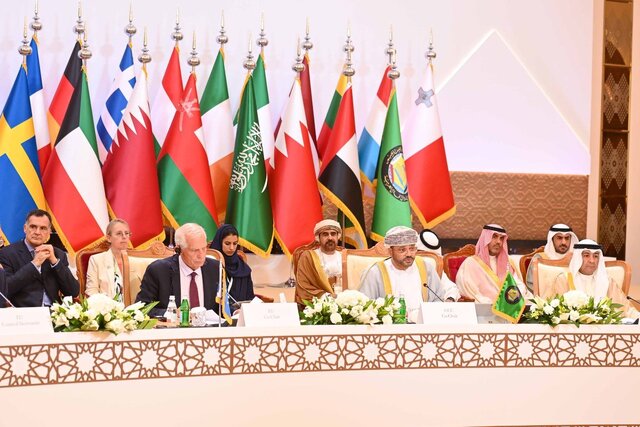
Meeting of the Council of Ministers of the European Union and the Persian Gulf Cooperation Council
This EU official made claims against Iran and said: During my service, I have seen an increase in the level of interaction between the European Union and Iran. Basically, because Iran has done all the things that were on the “do not do” list of the European Union. For example, we can mention the supply of weapons (and now ballistic missiles) to Russia for use in Ukraine, arrest of European citizens, internal repression and 2 direct attacks on Israel. Next, the whole topic of resistance is discussed; Yemen’s Houthis attacked our ships in the Red Sea, Hezbollah fired missiles at Israel, and other things. The nuclear issue is also clear.
He added: Therefore, today, our focus is on keeping communication channels open with Iran and encouraging all de-escalation processes and supporting them and normalizing relations between the Persian Gulf Cooperation Council and Iran, which is a broader process of normalizing relations in the region.
Conflict of interests of the European Union and the Persian Gulf Cooperation Council in matters related to third parties
In response to the fact that the interests of European countries and the Persian Gulf appear to have conflicting interests regarding issues related to a third party, Di Maio said, “Is this issue compatible with the overall goals of this strategic initiative?” When it comes to third-party conflicts, the interests of the EU and the GCC overlap. Their diplomacy, in particular, is very active. This diplomatic activism, 10-15 years ago, was mainly focused on existential threats (sometimes ideological and sometimes military). This has been vital to eliminate the biggest threats against their countries and their core national interests. My impression now is that they have come up with a diplomatic strategy to increase their influence globally.
The possibility of repeating the joint meeting of the European Union and the Persian Gulf Cooperation Council
In response to whether there is a plan to repeat the October 16 meeting, Di Maio said: This is a decision that rests with the European Union and the countries of the Persian Gulf Cooperation Council, although holding annual meetings is not always possible. But I think our goal is to make this meeting organized and purposeful. Of course, we must not forget that some extraordinary meetings can be held on some issues, it depends on the decision of the EU Presidency. So far, “Charles Michel”, the president of the European Council, and “Ursula von Derlein”, the president of the European Commission, have strongly agreed to hold this meeting and are fully aware of the importance of this moment in West Asia and for everyone. They are aware of the importance of the countries of the Persian Gulf Cooperation Council.
end of message
News>RCO NEWS
RCO




